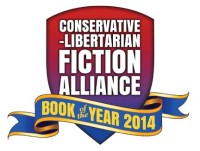The occasional story of breakout success by a first-time author (e.g., moi) often engenders fantasies of instant bestsellerdom among aspiring authors. Each thinks that his pathway to the top of the NYT list will be assured by his first effort. That is almost never true, however. I’m definitely an “outlier,” and your mileage may (and probably will) vary.
Thriller author Boyd Morrison offers some sage advice and perspective to writers, and I don’t disagree with any of what he has to say.
UPDATE: I just saw this short, sobering piece by Jason Boog, “The Financial Reality of the Genre Novelist,” which is also mandatory reading. The links within it, to posts by several representative authors, are also very much worth checking out. I have two important takeaways to highlight from Boog’s piece.
First, don’t embark on a writing career if your goal is easy, exorbitant wealth (or worse: fame). You’re competing for attention with a vast multitude of other aspiring writers, and each of your books is competing with literally millions of other titles. Takeaway #1: Write because you love to, or better yet: because you have to. Those are the kind of writers who have the best chance of succeeding, in any case.
Second, observe that the writers mentioned in the piece, who are lamenting their financial circumstances, are traditionally published authors. They have to wait around forever to get paid, and they share much of what little they do get paid with their publisher, agent, and the tax man. Takeaway #2: If you’re going to write books, seriously consider self-publishing.
ANOTHER UPDATE: Writers, don’t quit your day job…especially if you want to make a living via traditional publishing. I’ve been saying that for some time, but now Michael James Sullivan — a marvelous SFF author of my acquaintance (who has given me some great advice) — has taken the time to break down the numbers and show authors what they can really expect to make. Prepare to be shocked.
Let me underscore that these figures are for authors who are traditionally published. If you self-publish, a whole different set of calculations apply — and in my opinion (and experience), they’re far more favorable. But the next time you hear about some brand-new “bestselling author,” don’t automatically assume he’s a millionaire…or even close. He or she may be barely scraping by.
AND YET ANOTHER UPDATE: Back in 2009, in a two-part series, paranormal author Lynn Viehl posted her own shocking revelations about how pathetic her royalties were from her New York Times bestseller Twilight Fall. Her numbers underscore the points made in the posts linked above: Becoming even a “bestselling author” via traditional publishing is no guarantee of actually making a living — let alone astronomical income.
Viehl received a $50,000 advance against royalties. The book sold a net (after returns) of 61,663 copies, which put it at #19 on the Times mass-market list. But after everyone else (agent, tax man, personal expenses) was paid, that left her with a piddling net advance income of $24,517.36. And that advance money was divided into three installment payments, spread out over many months.
But that was just the “advance”; what about later royalties? Well, royalties are charged against advances, and if the book doesn’t “earn out” its advance (and most do not), then the author doesn’t get another dime of royalty income. Six months later, when her first statement came in, Viehl found that the book’s continuing sales had not yet earned out her advance, and so she received no royalty income at all. She comments:
In Publishing telling the truth about earnings smashes the illusions publishers and writers want you to believe and, like breaking mirrors, it never brings you good luck. Thing is, when I was a rookie I wanted to know exactly what it took to have a top twenty Times bestselling novel, because that was such a big deal to writers. Everyone I asked gave me a different answer, told me a bunch of nonsense, or couldn’t/wouldn’t tell me at all. For that reason I want you to see the hard figures, and know the reality, and the next time someone asks you what it takes, you can tell them the truth….
My income per book always reminds me of how tough it is to make at living at this gig, especially for writers who only produce one book per year. If I did the same, and my one book performed as well as TF [Twilight Fall], and my family of four were solely dependent on my income, my net would be only around $2500.00 over the income level considered to be the U.S. poverty threshhold (based on 2008 figures.) Yep, we’d almost qualify for foodstamps….
I know how important writer dreams are — sometimes they’re the only thing that keep us going — but I think they also have to be tempered by facing reality. To me, sharing an uncomfortable truth is better than perpetuating a myth. I know Publishing will never rise up to meet our expectations, but fiction belongs on the page, not in what we tell each other. Otherwise we risk becoming characters uttering lines of dialogue instead of working writers helping each other make good decisions.
What does this tell us? It means that only a handful of traditionally published rock-star authors make truly fabulous incomes. Even those who appear in the “top twenty” of national bestseller lists don’t necessarily make a living on a given book. Only if their income stream flows from a number of books can they expect to make a decent living.
By contrast — as I’ve pointed out elsewhere — those who choose to self-publish have a much greater likelihood of earning significant income, especially over the long haul. For one thing, because you don’t share your royalties with an agent or publisher, your income per book sale is several times higher than if you traditionally published.

 Photo (c) by Debbie Scott
Photo (c) by Debbie Scott




